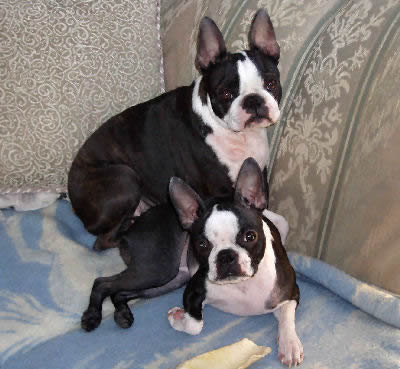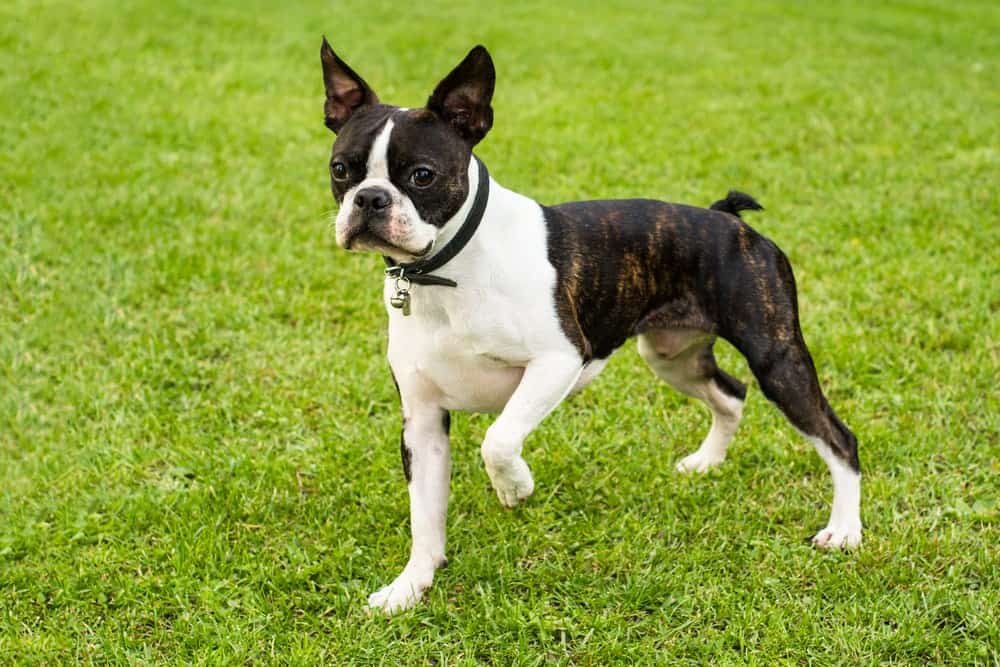
The well-mannered Boston Terrier is playful but gentle, a good match for families with small children.
Boston Terriers are popular as pets. Their enthusiasm and sense of humor are two of their most recognizable traits, but the breed is also well behaved and gentle. The Boston Terrier is very intelligent and enjoys learning new things, making training easy. Health problems to look for when selecting this breed include breathing problems and heart and skin tumors.
- Kingdom: Animalia
- Phylum: Chordata
- Class: Mammalia
- Order: Carnivora
- Family: Canidae
- Genus: Canis
- Species: lupus familiaris
Common Name(s)
Boston Terrier, Boston Bull, Boston Bull Terrier, Boxwood
Breed Type
The Boston Terrier is a non-sporting breed. Originally bred for fighting, today’s Boston Terrier is playful and well-mannered thanks to selective breeding. This breed is best suited to moderate climates, because it doesn’t tolerate extreme temperatures well.
Background
The Boston Terrier originated in the United States in the late 1800s. A descendent of unknown breeds of bull and terrier type dogs, the breed was much larger then than it is today. The dogs were bred selectively with smaller members of the breed and crossed with the French Bulldog to develop the modern Boston Terrier.
Popular hybrids include the Boglen Terrier, a Boston Terrier and Beagle mix.
Description
The Boston Terrier is a muscular dog, with a black and white or brindle and white coat. Their muzzles are short and wide, their eyes large and wide-set, and their ears small and pointed. Their tails are naturally short. Boston Terriers are 15-17 inches tall and weigh 10-25 pounds.
Care and Feeding
The best foods for a Boston Terrier contain beef, fish, wheat, and yellow corn. Boston Terriers require minimal grooming. They should be brushed fairly regularly, and bathed only when needed. Their faces should be wiped clean daily, and their nails clipped as needed.
Boston Terriers need yearly checkups. Vaccinations should be administered as follows:
- 6-8 weeks: Distemper, Leptospirosis, Hepatitis, Parainfluenza, Parvo, and Corona virus (DHLPPC)
- 10-12 weeks: Second DHLPPC
- 14-16 weeks: Third DHLPPC and rabies
- Annually: DHLPPC and rabies booster
Boston Terriers shed moderately. Regular vacuuming is recommended if you keep this breed inside.
Housing Your Dog
The Boston Terrier can live indoors or out, as long as it is not exposed to extreme temperatures. The breed is not very active indoors, and it is suitable for apartment living.
Social Behaviors
The Boston Terrier is a friendly dog, both with people and other pets. They do well around children and strangers. Some males may become dominant around other male dogs.
Handling and Training
Boston Terriers are, for the most part, easy to train. Some, however, may be difficult to housebreak.
Activities
Boston Terriers need a daily walk to stay fit. They enjoy playing outdoors as much as possible.
Breeding/Reproduction
When selecting a mate for your Boston Terrier, it is important to be aware of hereditary problems in the potential mate’s bloodline. Deafness, heart murmur, and luxating patellas are some things to look for. Cesarean sections are common in this breed, due to the puppies’ large heads.
Common Health Problems
Boston Terriers are prone to eye injuries, heart problems, and skin disorders. They may also have breathing problems due to the shape of their faces.
Availability
Boston Terriers are fairly easy to find due to their popularity. Average prices for puppies are $400 to $800.
References
“Boston Terrier“, Wikipedia, Copyright 2008
“Boston Terrier“, Dog Breed Info Center, Copyright 1998-2008
Cusick, William D., “What to Feed a Boston Terrier“, Referenced online, 2008
“Boston Terrier Puppies for Sale“, Copyright PuppyFind.com, LLC, Referenced online, 2008
Featured Image Credit: Lenka N, Shutterstock
